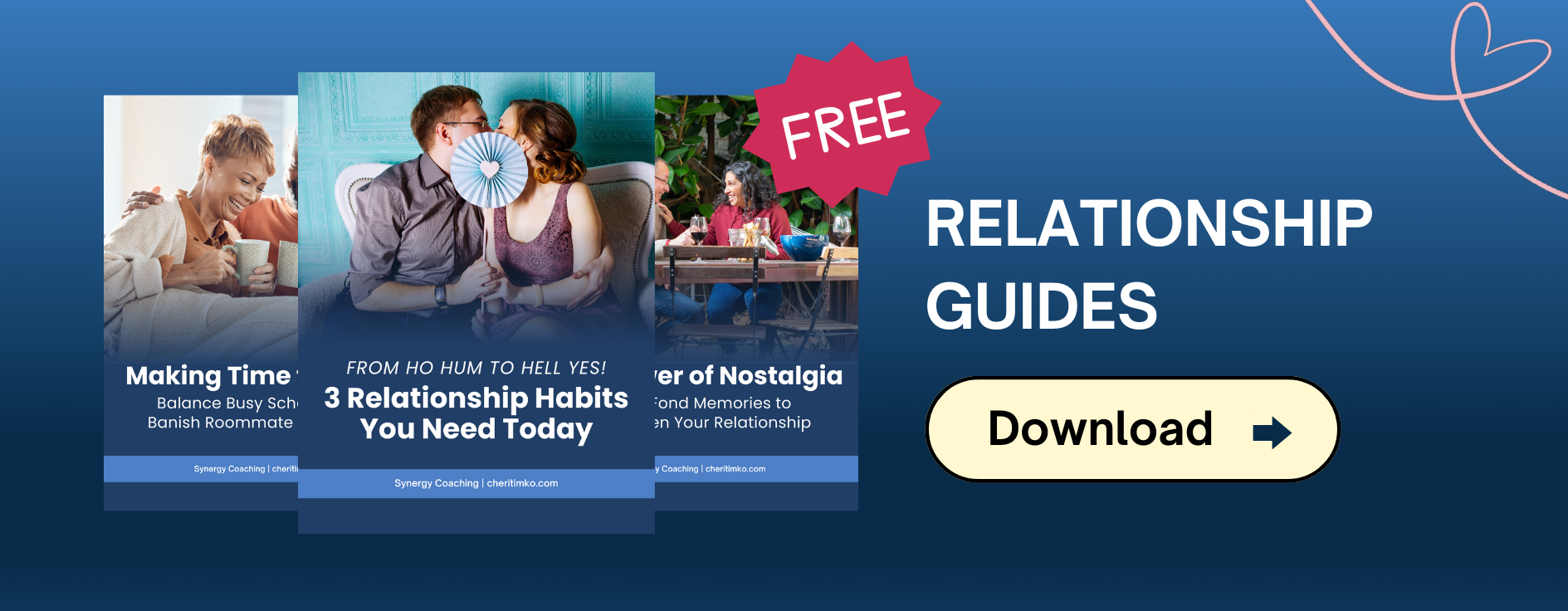Wouldn’t it be nice if you could just decide to have a good marriage? You could wake up and declare that today would be a good day. Then, you and your spouse would automatically be on your best behavior.

Unfortunately, having a great relationship takes some work. There is no reset button that will take you back to the clean slate that you had at the beginning. If you want your relationship to change, you need to create that difference.
While declaring it won’t make it true, having a good relationship does start in the mind. How you think about your relationship and your partner affects how good it actually is. Mindset shifts can move you towards the actual behavior changes that will make your relationship thrive.
A big hang-up is that we often ignore the good parts of the relationship when there is a problem. We treat the problem as if it defines the whole relationship. If you are going to have an extraordinary relationship, you need to keep the problem in perspective. This doesn’t mean ignoring a problem—it means remembering the bigger picture. You will still need to solve the problems.
Mindset Shifts:
1. Old thought: My partner is working against me.
New thought: My partner is my ally and wants the best for both of us.
Through many seasons of a relationship, there are not enough resources. The resources of time, energy, money, and attention are stretched thin. Demanding jobs, kids, health problems, and elderly parents will run you ragged. If you view your partner as your enemy, you will resent them for many things. You can more effectively address imbalances and other problems in the workload when you treat your partner as your ally.
2. Old thought: If we have an argument, our relationship is headed for disaster.
New thought: Conflict is an opportunity to fix some rough spots in the relationship. We are expected to disagree because we are two separate people with different ideas. We are supposed to have different ideas of how to handle situations.
When couples handle conflict well, it builds the relationship as they work through the problems. Couples need to have good conflict rules that reduces the ways that you hurt each other and good repair tools to clean up after an argument. When you work together, you build your confidence in the relationship. You believe that you can tackle anything together.
3. Old thought: If we aren’t always on the same page, we will grow apart.
New thought: My personal growth will help our relationship and trigger my partner’s growth. It’s normal to have time periods when we are out of sync.
Many couples feel distressed when they are out-of-sync. Feeling disconnected should be a warning sign. But it needs to trigger you to schedule some connecting activities. It is not an automatic sign that the relationship is over.
There may even be important reasons why it is helpful when you don’t experience the same thing at the same time. Part of this mindset shift is to see differences as a strength in the relationship. Differences can broaden your worldview and help you grow.
4. Old thought: Habits spell doom for the relationship.
New thought: It is wise to ensure that the activities that strengthen your connection happen regularly, even if they have to be planned.
Everyone wants spontaneity. We remember the beginning of the relationship as full of new and exciting activities that happened on a whim. For most couples, that isn’t really how it happened. You had to make time for one another. Later in the relationship, we get busy with the other challenges of life. If you don’t have space on your schedule to spend with one another, those connecting activities won’t happen. You have to make time for spontaneity.
5. Old thought: Our relationship is defined by the problems.
New thought: Our relationship has good parts and tough parts. It is a good relationship because we are committed to growing as people and co-creating the life we truly desire.

In most relationships, more is going well than wrong at any given time. I’m sure that you could find some exceptions for me, but I argue that it is true the vast majority of the time. Yet, we spend the majority of our time and energy focused on the problems. Part of having a great relationship is to be able to see the whole picture. You need to give credit to the things that are going well.
Mindset shifts take a little work to adopt. You will need to listen to find the assumptions that echo in your mind and sneak into your conversations. When you hear the old ideas, ask yourself a few questions to challenge them:
1. Is it true?
Often, we make sweeping statements that have a grain of truth to them, but also ignore the big picture.
2. Does this idea support or create the relationship you truly want?
How you think about your life strongly affects how you experience it. If you want a good relationship, you need to remind yourself that a good relationship is possible.
3. Is there another explanation or framing of this situation?
When you entertain other ways of thinking, it disrupts the normal flow of thoughts. When you interrupt those thoughts, you can examine them and explore other explanations. When you ask yourself for other explanations, you start to see what else is there.
Mindset work is very powerful. It can change the trajectory of your relationship. If you feel like things are going in the wrong direction, it is valuable to at least consider if you can change things by thinking about them differently. You will likely feel better about the whole situation if you can shift how you think about it.
Need help shifting your mindset in a way that improves your relationship? Start making changes today with the free Relationship Guides.
